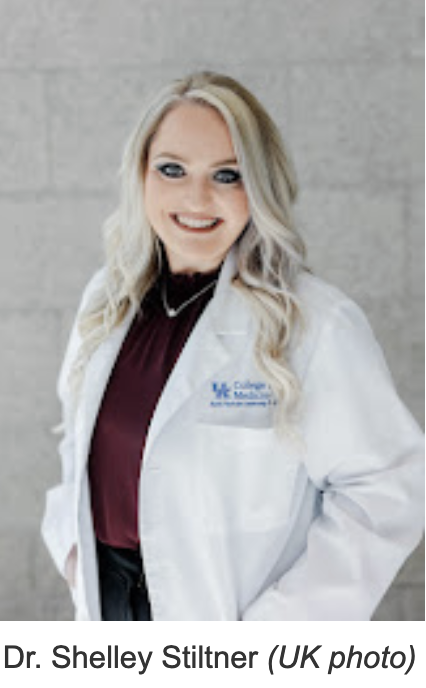New UK medical-school graduate plans to pay it forward with a career in rural Kentucky, which needs many more physicians

The University of Kentucky‘s Rural Physician Leadership Program is designed to increase the number of doctors in rural Kentucky, with graduates like Pike County native Shelley Stiltner.
After earning a UK undergraduate degree in nutrition, Stiltner graduated from the College of Medicine May 13. She is a first-generation college student who attended UK on a full scholarship, which she said she considered not only an investment, but also a thank-you to all of the people who helped her on her way, according to UK Medicine magazine.
Stiltner said she plans to embark on a career in rural medicine, not only to care for patients in need but to help inspire the next generation of rural physicians.
She added that she worried when she started college and at times, even now, that the stereotype that is often applied to Eastern Kentuckians will overshadow who she is.
“I spent so much time worrying that being from Eastern Kentucky would be my weakness, but it was my strength all along,” she said.
Stiltner said she chose UK for medical school because of its “unwavering dedication to rural medicine” and called her decision to join the Rural Physician Leadership Program “one of the most rewarding decisions of my lifetime.”
“I have gained unmatched experience in rural health care and feel confident in my ability to take what I have learned and truly make a difference in a rural community,” she said. “UK saw a grave health care need in rural Kentucky, which I call home, and developed a program to bridge the gap. For that, I am grateful.”
The need for more rural physicians is real and UK’s RPLP program appears to be working.
According to the federal Healthcare Provider Shortage Area tool, every rural county in Kentucky has a shortage of primary health-care providers.
And, according to a January 2020 report on the primary-care workforce shortage compiled by multiple authors at UK, “Kentucky produces and retains only about 55 new PC [primary-care] physicians per year, recruiting 55 to 60 more from out of state. This total of 110-115 new physicians falls short of the 124 PC physicians that must be added annually to avoid worsening our shortage, and far below the 246 PC physicians that Kentucky would need to add each year to reach the U.S. median in the coming decade.”
The RPLP program began in 2009 and with this year’s class, it has graduated 110 physicians who are well-versed in rural medicine, with their top three residency choices being areas of primary care, Allison Perry of UKnow reported in April. Two of every three RPLP alums are practicing in the state, and 92% of the participants from Kentucky now practice in rural Kentucky.
One is Stiltner. Asked what comes next, she listed several goals such as focusing on women’s health, getting involved in providing medication-assisted treatment to women with substance-use disorders during pregnancy, and making an investment in the next generation of rural physicians by serving as a mentor.
“There is no way I’d be where I am today without the help of mentors along the way,” she said. “A promise I made to each of them was that I would pay it forward, and that is a promise I plan to keep. If I can inspire at least one budding rural physician that they have what it takes to make it in medicine, I will consider my career a success.”
Stiltner advised future first-generation college students to “proudly be the first” in their family though it will be scary and come with a lot of uncertainty. She encouraged the students to find others who have been first-generation students and to lean on each other in that shared experience.
“When things get hard, and you feel like giving up,” she said, “remind yourself who or what your purpose is in chasing this dream.”